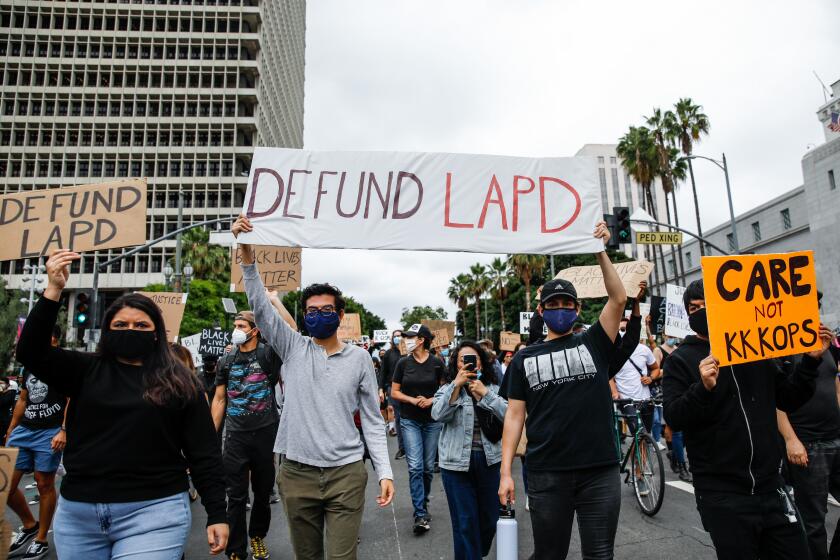London Breed pushes San Francisco reforms: Police no longer will respond to noncriminal calls

SAN FRANCISCO — San Francisco police officers will be replaced with trained, unarmed professionals to respond to calls for help on noncriminal matters involving mental health, the homeless, school discipline and neighbor disputes, as part of a new wave of police reforms.
That change and others, which will be implemented over the coming months, are part of a plan by Mayor London Breed to try to reduce police confrontations with the community. Breed unveiled her proposals after weeks of massive protests over the May 25 police killing of George Floyd in Minneapolis.
“San Francisco has made progress reforming our police department, but we know that we still have significant work to do,” Breed said. “We know that a lack of equity in our society overall leads to a lot of the problems that police are being asked to solve.”
The plan is similar to the CAHOOTS program in Eugene, Ore., where a medic and a mental health crisis manager respond to emergency calls for help with individuals suffering from severe mental illness, addiction and homelessness. The mobile crisis intervention unit also performs welfare checks and works with nonprofits to offer suicide intervention and prevention.
Breed announced that she has directed the San Francisco Police Department to establish an “explicit” policy to ban the use of military-grade weapons against unarmed civilians. The department would not be allowed to use chemical weapons, such as tear gas, bayonets or tanks and would have to get rid of such weapons by the end of 2021.
Starting immediately, the city’s Department of Human Resources will audit hiring and promotional exams by the Police Department and San Francisco Sheriff‘s Department and incorporate testing for bias and potential for abuse of force, Breed said.
A 2016 report from the city’s Budget and Legislative Analyst’s Office estimated that the city incurred nearly $21 million in 2015 to enforce quality-of-life laws against homeless residents. Police accounted for more than 90% of the costs and responded to more than 60,000 incidents from January to November 2015.
“For too long, black people have been subjected to violence at the hands of people in power,” Breed said during a panel Thursday on racial justice broadcast online. “Now is the time when we can make sure that these demonstrations that we see are translated into real action.”
Defunding police is not a new idea, and it is not a panacea. It’s also not crazy.
San Francisco Police Chief William Scott, who joined Breed on the panel with civil rights activist and television commentator Van Jones and Board of Equalization chairwoman Malia Cohen, endorsed the reforms. He said the Police Department was also working to change its policy on releasing booking photos.
Scott said a new policy within a couple of weeks would “reel back” the release of booking photos, a decision he reached after talking to experts about how such photos influence biases of officers and the public.
“The point is rethinking policies and what the things that we are doing add to that association of who is a criminal, who is not, who is dangerous,” Scott said.
He said the photographs help promote stereotypes.
“As a black man, I can’t tell you how many times I’ve walked by a car and heard the door’s lock click,” Scott said.
Tony Montoya, president of the San Francisco Police Officers Assn., called the mayor’s proposal a “reasonable approach.”
“The San Francisco Police Department has some of the most prescriptive use-of-force policies in the nation that include strong transparency and accountability provisions,” Montoya said. “The SFPOA is always open to engaging in collaborative discussions with the mayor, and other stakeholders, to improve policing in our city.”
Jay Cheng, public policy director for San Francisco’s Chamber of Commerce, said Friday that small businesses embrace the proposed reforms.
“From the Chamber’s perspective, it is the smart, moral and right move to make,” Cheng said. “The business community has always wanted the SFPD to focus more on serious crime and not be engaged in noncriminal activities.”
He said the SFPD now receives about 40,000 calls a year about homeless people living on the streets. Social workers familiar with unsheltered residents and people who suffer from brain disorders will be more effective than police in improving street conditions, he said.
“It is not great to see people in misery on the streets,” he added. “We want to see real solutions.”
Tyra Fennell, a Black San Francisco resident and founder of a nonprofit arts group for the poor, also praised the reforms. She said Breed’s proposals were “really leaning into the spirit” of what the movement to defund police wants.
Defunding, she added, means a reallocation of resources.

Nationwide, protesters and activists have been calling to “defund the police.” But what does it actually mean? And why are so many people calling for it to happen?
“We don’t want untrained police officers dealing with the mentally ill because they are ill-equipped,” she said, adding that Breed will need the support of the community and the activists to carry out her proposals.
Fennell oversaw the lettering of Black Lives Matter on 2 1/2 blocks of city streets in the city’s Western Edition. She lives in the Bayview-Hunters Point district, which she called “San Francisco’s last Black neighborhood.”
The Associated Press contributed to this report.
More to Read
Sign up for Essential California
The most important California stories and recommendations in your inbox every morning.
You may occasionally receive promotional content from the Los Angeles Times.












